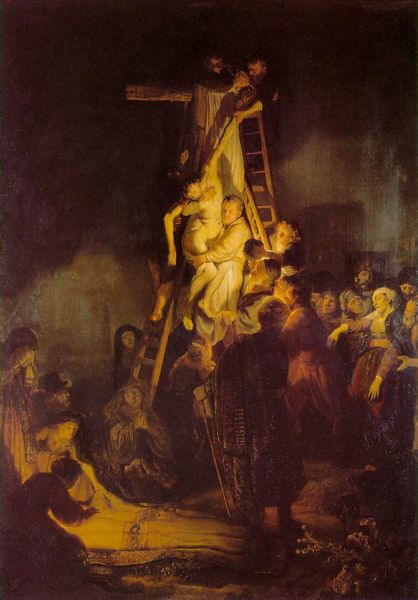What Easter Means to Me
Easter, to me, means that Jesus is in control.

Rembrandt, Descent from the Cross (1634)
His arrest and crucifixion were not events that came upon Him unexpectedly. Instead, right from the very beginning of His ministry, He repeatedly told His disciples, “The Son of Man is going to be betrayed into the hands of men. They will kill Him, and on the third day He will be raised to life” (Matthew 17:22-23; see 16:21; 20:18-19; 26:2,10-12). It was His plan all along, “just as the Son of Man did not come to be served, but to serve, and to give His life as a ransom for many” (Matthew 20:28).
No ordinary man could have orchestrated things the way that they happened. On the surface, it may seem as if Jesus was not in control, as He was betrayed, arrested, beaten, condemned, and crucified. However, even the betrayal by His friend and disciple Judas (Matthew 26:20-25; see Psalm 41:9), and the gambling for His clothes by the Roman guards at the foot of the cross (Matthew 27:35; see Psalm 22:18), were all part of His Master Plan, as prophecy after prophecy was fulfilled in every detail. The Bible is clear that Jesus’ death on the cross was not an unexpected “accident”; instead, it was a choice that He made as the ultimate demonstration of His love for all mankind. After all, as Jesus Himself said, “Greater love has no one than this, that He lay down His life for His friends” (John 15:13), and as the apostle Paul wrote to the Roman church thirty years later, “God demonstrates His own love for us in this: While we were still sinners, Christ died for us” (Romans 5:8). When it comes to the fact of His death, Jesus was still in control.
Have you ever stopped to think about the details of that “Good” Friday twenty centuries ago? Notice that Luke wrote in his gospel, “Jesus called out with a loud voice, ‘Father, into Your hands I commit My spirit.’ When He had said this, He breathed His last” (Luke 23:46). Most victims of crucifixion would slowly pass out and eventually die of asphyxiation. However, Jesus did not die in the normal way. Instead, He chose the exact moment of His death, thus proving His words, “I lay down My life — only to take it up again. No one takes it from me, but I lay it down of My own accord. I have authority to lay it down and authority to take it up again” (John 10:17-18). Even when it comes to the timing of His death, Jesus was in full control!
If Jesus’ death was the end of the story, it would be a sad story indeed, because it would only be the story of a man who was defeated by death. But three days later Jesus proved that He was more than just a man, and that He had the ultimate control over death itself, by walking out of the tomb alive and well and for all to see!
What does all of this mean for you and me today in the third millennium? If Jesus had control over the fact of His death, the timing of His death, and death itself, the most sensible and reassuring thing we can do is to give Him control over our lives as well. When it comes right down to it, there is not really all that much in our lives that we have control over. However, the One who heard the cry for help from the thief hanging next to Him on Golgotha, is the same One who hears our cries for help today. And I don’t think that we could ever go wrong in taking our finances, our relationships, our jobs, our ministries, and our lives, and turning control of them over to Him. After all, if He can keep this entire universe running smoothly (see Colossians 1:17; Hebrews 1:3), He should be able to keep our lives running smoothly too.
Category: Living the Faith


